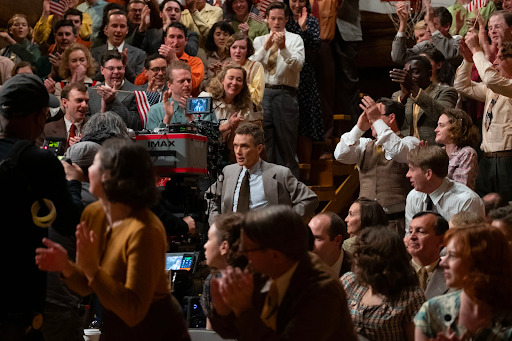I’m not quite sure if we will ever be able to answer this question once and for all: Is OPPENHEIMER an anti-war film? Does Hollywood make true anti-war films anymore? Have they ever?
As with most great works of art, OPPENHEIMER’s political stance depends on viewer perspective: your firmly pro-American imperialism war hawk uncle will find OPPENHEIMER treasonous for its sympathetic portrayal of American Communists during WWII, and your DSA friend who equates the words “Manhattan Project” with “pure evil” is almost guaranteed to find the film equally abhorrent for opposite reasons. It would instead be more productive to resist the urge to fit this film into a box.
The politics of the film OPPENHEIMER accurately reflect the politics of Robert Oppenheimer the man—strongly held but ever-changing, and, like most people, ultimately self-serving. I’m not saying that one can fully sum up this weighty film in terms of sex drive alone, but one must admit that supporting Communism gets him into Jean Tatlock’s pants; disowning Communism gets him into Kitty’s. Like his scientific studies, his political ideas and alliances are abstract until he is forced to make more concrete decisions by outside forces. Supporting Communism makes him popular among his young students at Berkeley, and earns him applause; in the same vein, supporting the bombing of the Japanese earns him applause among the Americans at Los Alamos. Beginning the film as a kind of a picked-on loser, it doesn’t much matter where the applause is coming from… That is, until those pesky moral qualms set in. Oppenheimer may now be known as the American Prometheus, but Nolan wants us to see that this God is a guy with his own selfish needs and anxieties.

In the same way Oppenheimer can’t commit to Communism, he can’t quite commit to his American imperialist convictions either. In fact, the only thing he can commit to is letting mentally ill brunettes ruin his life (more on Jean Tatlock and Kitty Oppenheimer later). Either you buy that Oppenheimer truly, naively believed that the A-bomb would bring about Roosevelt’s idea of world peace, or you firmly agree with George Carlin that fighting for peace is like fucking for chastity, or maybe you fall somewhere in the middle. The one argument you could make that points to OPPENHEIMER as an anti-war film would be the way the ill fates of its Communist characters are lamented. Blacklisted, exiled, and even killed, none of Oppenheimer’s Communist friends (Frank, Lomanitz, Chevalier, Jean) meet a happy ending, and this is rather difficult for Oppenheimer to stomach. Even as the most famous man in the world, there was very little he could do to prevent this, and he hardly holds any responsibility for the viciously anti-Communist apparatus in the country he’s tailoring homegrown weapons for.
Kitty expected her husband to stand up for himself in the bureaucratic arena, and was frequently disappointed, whereas Jean saw Oppenheimer for who he really was: not the golden boy, but a scared little one. Jean and Kitty are real human beings with their own fraught relationships to Communism, but they also represent two distinct times in Oppenheimer’s life—one in which he could afford to be naively hopeful, and one in which he could not. With Jean, Robert could wax poetic about death while doing the nasty. There were no stakes, and if there were, they didn’t seem real. Jean and Robert had smoldering chemistry, but Kitty can offer him the stability he needs to face the trials of Los Alamos (well, unless there’s a baby crying nearby). At first, I was annoyed by the casting of Florence Pugh as Jean Tatlock because I have not yet forgotten her cloying crocodile tears in DON’T WORRY DARLING, and I find it hard to believe that person is capable of attending medical school. I do believe that person is capable, however, of severe clinical depression, so in that way, Pugh’s performance worked.
Kitty and Robert did what they had to do to survive politically, including renouncing Communism and their friends, because they were up against very real consequences if they didn’t; just look at what happened to Jean. For my money, the most politically subversive shot in the whole film is a brief one of a black gloved hand gripping the back of Jean Tatlock’s neck during her death scene. It’s a shot that heavily implies doubt that she committed suicide. Much like the politics of the movie, whether this is Oppenheimer’s doubt or Nolan’s (or both) is up for debate.

The argument that OPPENHEIMER is a pro-war film is a bit more obvious. The omission of the victims of the bombings at Hiroshima and Nagasaki is glaring. Images of burning bodies are ones that Oppenheimer had to contend with, and not providing the audience the opportunity to contend with these images is a failure in a film that is otherwise a success. Before you start yelling at me, please consider that I’m not saying Nolan should have dedicated an entire hour to the horrors of the bomb, because, for better or worse, that wasn’t the story he sought to tell. He instead chose to focus on one man’s experience rather than broaden the focus to cover the breadth of man-made horrors beyond our comprehension. Nolan does include a shot of Oppenheimer watching footage of the aftermath in horror, but he does us a disservice by not flipping the camera around and showing us what Oppenheimer had to see.
Not only do the politics of the film reflect Oppenheimer’s inner life, but the structure of the film does as well. Oppenheimer believes the success of Trinity to be the climax of his life, as the audience believes the success of Trinity to be the climax of the film; life proves us all wrong. Who would have thought developing the A-bomb would come with consequences? I know we’re all mad at Oppenheimer for not having perfect politics, but put yourself in his loafers: you think creating the world’s deadliest weapon of mass destruction for the American defense department should be enough to keep you safe for a good while, but here comes a balding, jealous, petty ass bitch who’s pressed because Einstein looked at him slightly weird once, and the dramatic structure of your life changes completely. The genre of your life switches from wartime drama to courtroom procedural before you can say “Trinity.” You think the DOD will care about your (albeit indecisive) political opinions, but instead they treat you like an overeager woman after a mediocre date. Matt Damon as General Leslie Groves (played like a Coen Brothers character) is saying he’ll call, but you know he won’t. Almost worst of all, it turns out being the most famous man in the world isn’t enough to protect you against your wife calling you a pussy in front of your boys.
In its reflection of Oppenheimer’s indecisive, abstract politics, as well as his trials and tribulations as a Sad Boy, OPPENHEIMER is Nolan’s most human film, and for that reason, it is my personal favorite in his oeuvre. I’ve never been one to mock a movie for being for “film bros,” and this might be the most female-brained thing I’ve ever written, but I’ve never understood the ending of INCEPTION and I’m okay with not knowing if I ever will. While still employing Nolan’s usual tricks of cinematic manipulation, OPPENHEIMER doesn’t rely on gimmick the same way INCEPTION and MEMENTO and THE DARK KNIGHT do (just because it’s the best of the superhero movies doesn’t make it not a superhero movie). OPPENHEIMER works so well because we are more invested in Oppenheimer’s mixed bag of emotions than in Nolan’s stunning formal technique.
















Comments